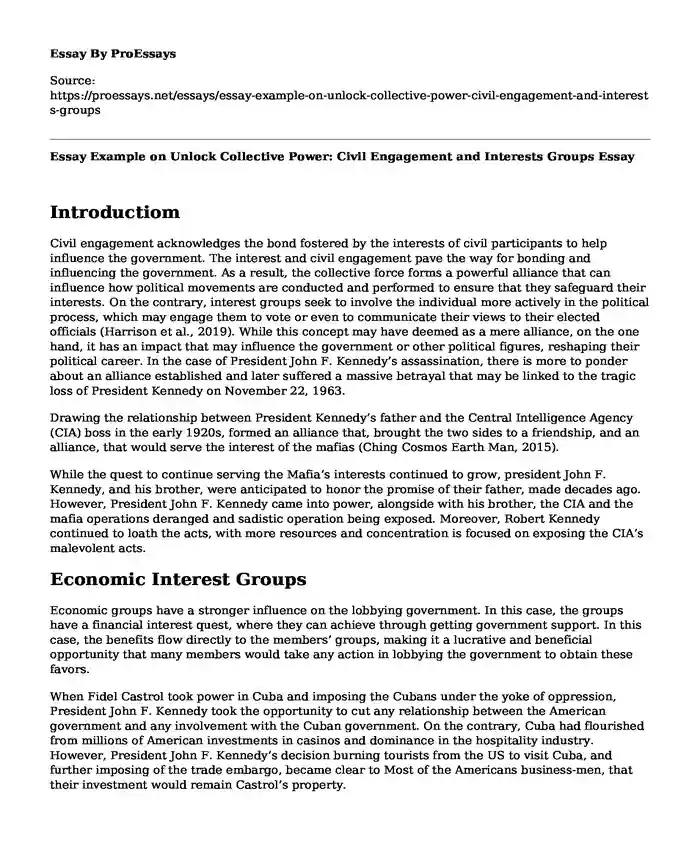Introductiom
Civil engagement acknowledges the bond fostered by the interests of civil participants to help influence the government. The interest and civil engagement pave the way for bonding and influencing the government. As a result, the collective force forms a powerful alliance that can influence how political movements are conducted and performed to ensure that they safeguard their interests. On the contrary, interest groups seek to involve the individual more actively in the political process, which may engage them to vote or even to communicate their views to their elected officials (Harrison et al., 2019). While this concept may have deemed as a mere alliance, on the one hand, it has an impact that may influence the government or other political figures, reshaping their political career. In the case of President John F. Kennedy’s assassination, there is more to ponder about an alliance established and later suffered a massive betrayal that may be linked to the tragic loss of President Kennedy on November 22, 1963.
Drawing the relationship between President Kennedy’s father and the Central Intelligence Agency (CIA) boss in the early 1920s, formed an alliance that, brought the two sides to a friendship, and an alliance, that would serve the interest of the mafias (Ching Cosmos Earth Man, 2015).
While the quest to continue serving the Mafia’s interests continued to grow, president John F. Kennedy, and his brother, were anticipated to honor the promise of their father, made decades ago. However, President John F. Kennedy came into power, alongside with his brother, the CIA and the mafia operations deranged and sadistic operation being exposed. Moreover, Robert Kennedy continued to loath the acts, with more resources and concentration is focused on exposing the CIA’s malevolent acts.
Economic Interest Groups
Economic groups have a stronger influence on the lobbying government. In this case, the groups have a financial interest quest, where they can achieve through getting government support. In this case, the benefits flow directly to the members’ groups, making it a lucrative and beneficial opportunity that many members would take any action in lobbying the government to obtain these favors.
When Fidel Castrol took power in Cuba and imposing the Cubans under the yoke of oppression, President John F. Kennedy took the opportunity to cut any relationship between the American government and any involvement with the Cuban government. On the contrary, Cuba had flourished from millions of American investments in casinos and dominance in the hospitality industry. However, President John F. Kennedy’s decision burning tourists from the US to visit Cuba, and further imposing of the trade embargo, became clear to Most of the Americans business-men, that their investment would remain Castrol’s property.
For instance, Kennedy’s crackdown on Mafia’s movement and damaging of their business in Cuba made it cumbersome for them to withstand the pressure of oppression. As a result, the increasing pressure and destruction of their hospitality businesses in Cuba, which were hardly receiving tourists from the United States, meaning that no profits could be obtained. On the contrary, Kennedy’s made it routine for monitoring both Carlos Machelo and Santos Trafacante, to avoid them lobbying the government (IChing CosmosEarthMan, 2015). As a result, the heightening of these rules meant more suffering and a big loss of economic progress to the mafias, who had deep roots and influence within the CIA (IChing CosmosEarthMan, 2015).
The Mafia’s Hitman
The assassination of President John F. Kennedy may be deemed as an economic interest group backed organization, who purported the assassination. According to IChing CosmosEarthMan, (2015), the US entered the Vietnam war, on the quest to liberate Southern Vietnam from the spread of communism. However, this brought about the blocking of transportation of heroin from Vietnam to the United States. As a result, President John F. Kennedy became the hero in fighting against drugs. However, this limited economic benefits for the Mafia group, who then plotted on removing him from power through the assassination.
Conclusion
There are strong ties between the video and the book, especially considering the economic gin and financial benefits. President Kennedy’s assignation is directly interlinked to financial interests and power. Based on the fight against communism in Vietnam and Cuba, president Kennedy, affected many American businesses in Cuba, leaving him as the right target to eliminate. On the contrary, his strong decisions and war against drugs in the US meant that business for the Mafia’s and corrupt government officials were not in the position to lobby the government with Kennedy in power. Therefore, this paved an avenue for them to plot against him.
References
Ching Cosmos Earth Man. (2015). Frame 313: The JFK Assassination Theories (2008) [Video]. Retrieved 22 July 2020, from https://www.youtube.com/watch?v=p-Z_Bm-93VY.
Harrison, B., Harris, J., & Deardorff, M. (2019). American democracy now (6th ed., pp. 226-390).
Cite this page
Essay Example on Unlock Collective Power: Civil Engagement and Interests Groups. (2023, Oct 15). Retrieved from https://proessays.net/essays/essay-example-on-unlock-collective-power-civil-engagement-and-interests-groups
If you are the original author of this essay and no longer wish to have it published on the ProEssays website, please click below to request its removal:
- Two Different Approaches to a Murder and What That Tells us About the 19th Century
- Essay Sample on Criminal Justice System with Reference to Privatization
- Speech Analysis Essay on Sen. Booker Inspirational Speech
- China Religions and Beliefs Essay Example
- UK Charity Hit by Cyber Attack: NCA Investigates Data Theft
- Essay Example on Adams Morgan: DC's Unique, Culturally Vibraant Neighborhood
- Essay Example on Free Black Activism: Demanding Rights, Justice, and Liberty







